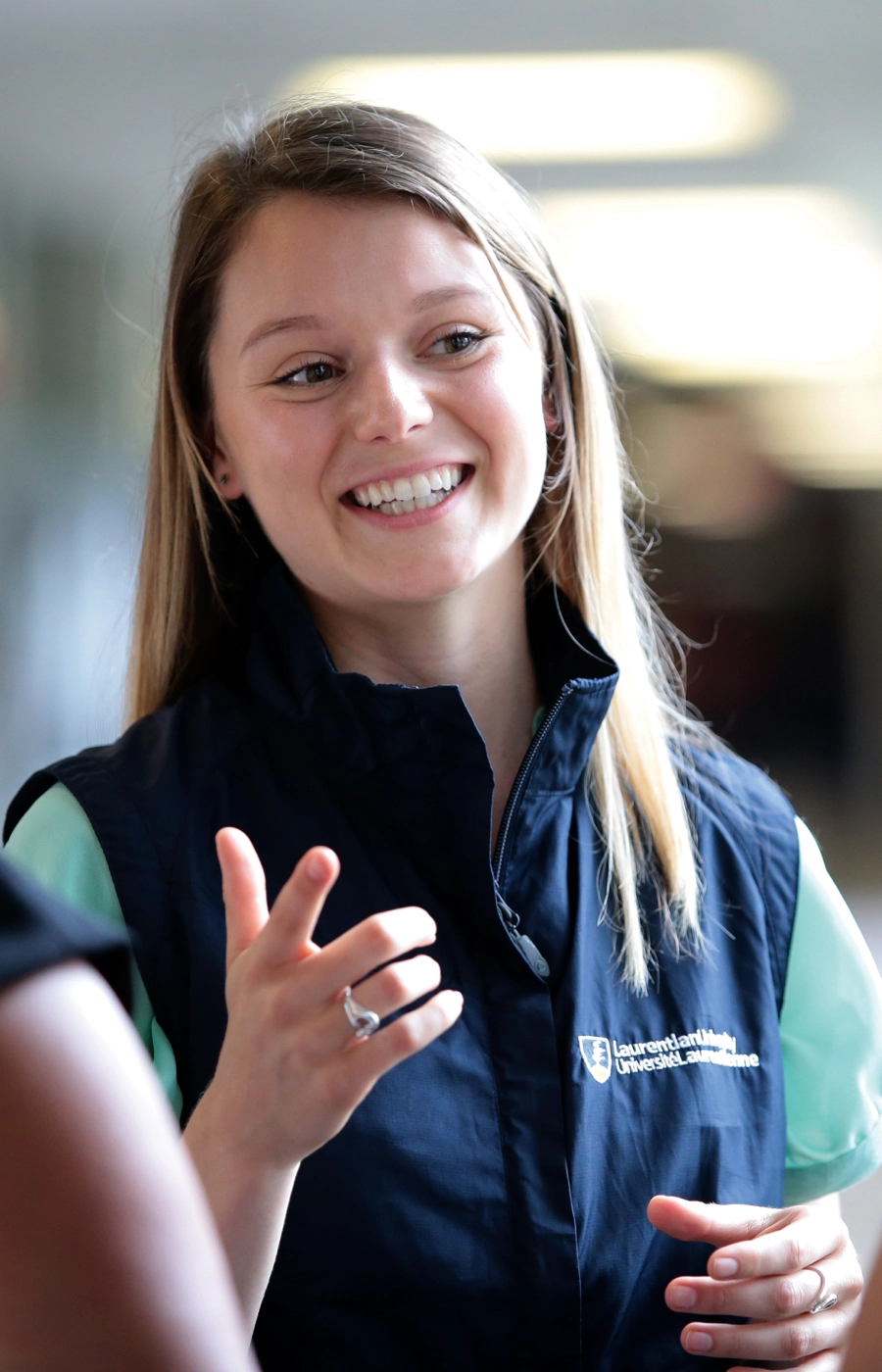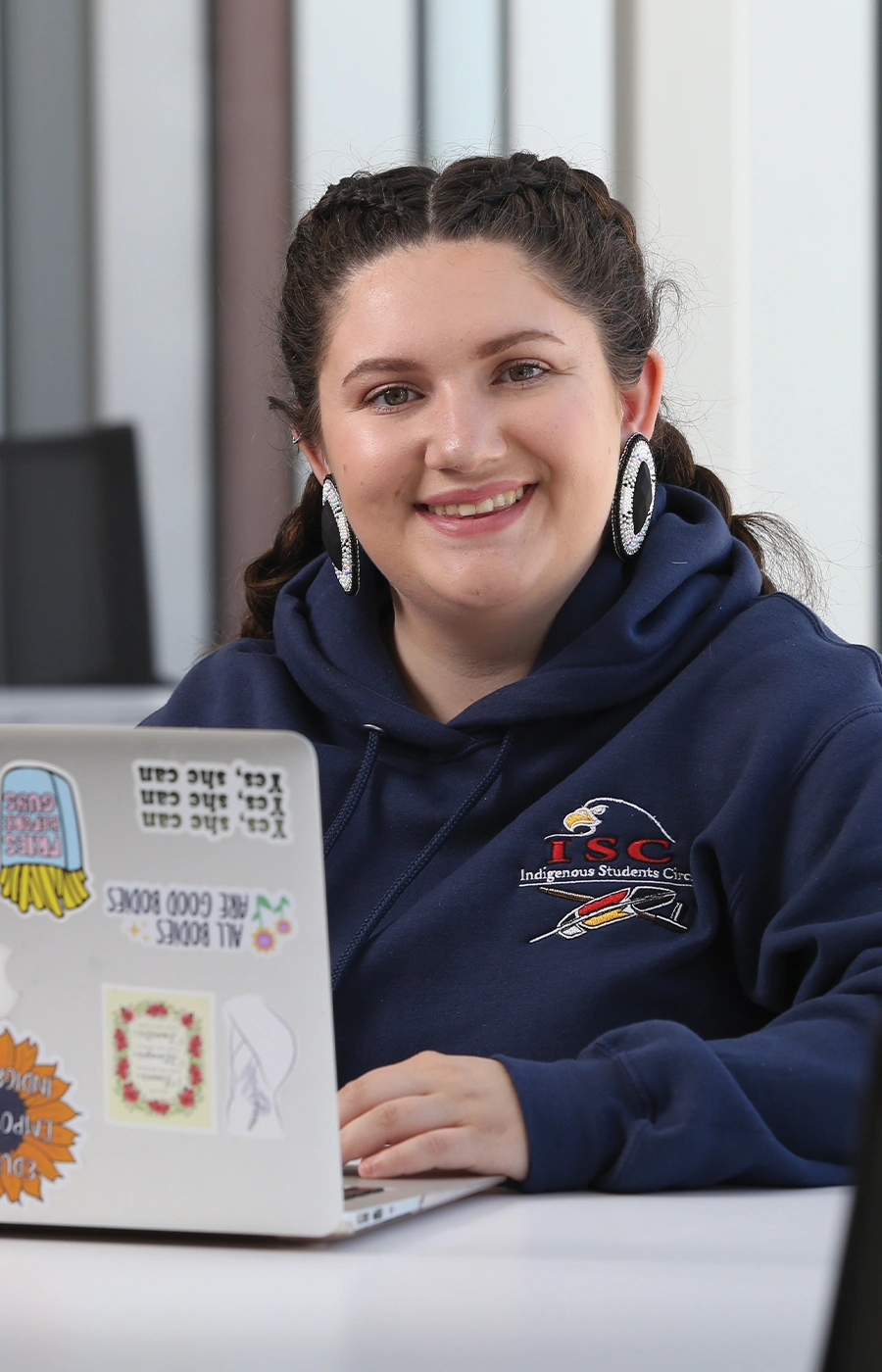
Biomolecular Sciences (PhD)
Faculté des sciences, de génie et d’architecture
Gain academic and research training to prepare for careers in research, teaching, biotechnology, pharmaceuticals, and biomedicine. Learn the most current methods and technologies and develop new knowledge and skills.

Survol du programme
Help develop a better world for everyone by improving health care, agriculture, energy consumption, and the environment. Effect big changes while working at a small scale.
The Ph.D. Program in Biomolecular Sciences provides academic and research training to students pursuing careers in academic research and teaching as well as the biotechnology, biomedical and pharmaceutical industries. Students can choose between two fields of study:
- Cell Regulation
- Structure and Function of Biomolecules
Students will be trained in the most current methodologies and develop new knowledge and skills. Students enrolled in the program will conduct advanced research and present their work at regional, national, or international meetings, as well as in the form of publications in peer-reviewed journals. The coursework required by the program exposes the students to current advances in theory and methodologies in the Biomolecular Sciences.
In addition, the program will help develop critical thinking skills through the review of published research papers, appraisal of their own laboratory experiments, and the preparation and defence of a grant proposal as part of the requirements of the comprehensive examination.
Note: The Biomolecular Sciences PhD Program is offered in English.
Small classes and research groups provide unique opportunities for all our students to interact with other peers and faculty members.
Cutting-edge research led by faculty who are leaders in their field.
Great opportunity to receive a paid Graduate Teaching Assistantship.
Perspectives de carrière
After graduation, our students can explore various career opportunities in fields such as:
- Research
- Biomedicine
- Teaching
- Biotechnology
- Pharmaceuticals

As a Biomolecular Sciences Ph.D. program student at Laurentian University, my learning and experiences have exceeded my expectations. The program's structure has provided invaluable hands-on experiences in bench-top research and international collaboration and offered opportunities to present my research at prestigious conferences. Through engaging in grant proposals and publications, I've improved upon skills critical for success in an academic career.
The diverse faculty involved in the program provides a wealth of knowledge and expertise, aided by its interdisciplinary nature. The breadth of research undertaken within Biomolecular Sciences has benefited me by providing multiple perspectives on my projects and refining my research. Furthermore, interactions with peers within the program and the broader Laurentian University community have been foundational to my personal and academic growth.
Michel Lapointe
Détails du programme
Langue du programme:
Anglais
Mode de présentation:
Sur campus
Veuillez écrire à l’adresse courriel ci-dessus et notre équipe de recrutement vous répondra!
En savoir plus sur le programme
Entry into the Program requires completion of an M.Sc. in a related discipline (e.g. Biology, Chemistry, Biochemistry, Medical Sciences, etc) or by “transfer” from the existing M.Sc. programs at the end of the first year of study, upon completion of the M.Sc. coursework and recommendation of the Supervisory committee.
Admission is conditional to students securing the consent of a faculty member to supervise their research during their PhD studies.
Information and Files for Current Students
Exigences d’admission
Entry into Ph.D. studies within the Program can be granted after completion of an M.Sc. in a related discipline (e.g. Biology, Chemistry, Biochemistry, Medical Sciences, etc) or by “transfer” from the existing M.Sc. programs at the end of the first year of study, upon completion of the M.Sc. course work and recommendation of the Supervisory committee.
Application Process
Step 1. Contact the Graduate Coordinator and/or individual faculty member about the possibility of becoming a student. Students are encouraged to consult the faculty list on the Faculty Members tab in order to identify a potential supervisor (i.e. a faculty member they would like to work with).
Step 2. Click here to submit the online application. Once students have applied, they will receive instructions (typically within 48 hours) from the Office of Admissions leading them to the MyLaurentian portal. Students can access the portal at my.laurentian.ca; sign in credentials will be provided in the correspondence received from the Office of Admissions upon successful completion of an application. The following documents will be required in order to complete an application.
Documents:
- Three Reference Forms (to begin the process at my.laurentian.ca click on "Reference Submission" on the left-hand navigation menu)
- Statement of Interest (to be uploaded via MyLaurentian)
- Curriculum Vitae/Resume (to be uploaded via MyLaurentian)
- Official Academic Transcript(s) from all post secondary studies* (Please note that current or prior Laurentian University students do not need to request transcripts)
*Please note that official transcripts or WES course-by-course (for institutions attended outside of North America) must come directly to the Office of Admissions from the previous post secondary institution by requesting at the time of your application or by contacting the institution's Registrar's Office.
Step 3. Once the Admissions Office receives all information and the application is deemed complete, the application will be forwarded to the department. An Admissions Committee meets to review the applications.
Step 4. The Admissions Committee will review all applications on file and make a decision regarding the suitability of each applicant. The Admissions Committee will then make a recommendation to the Dean of the School of Graduate Studies at Laurentian University. The Graduate Studies office will verify the dossier and if satisfactory, the Dean of Graduate Studies will forward the recommendation to the Office of Admissions at Laurentian University for admission.
Step 5: If approved for admission, the Office of Admissions will send the student an Offer of Admission via MyLaurentian. Applicants wishing to accept the offer of admission must indicate their response on MyLaurentian within 3 weeks of receiving the offer. Once the student has accepted the offer, a transition to the registration process occurs.
Comment déposer une demande
Pour faire une demande aux études supérieures, vous devez déposer votre demande d’admission auprès du Centre de demande d'admission aux universités de l'Ontario (CDAUO).
Pour obtenir des instructions détaillées sur le processus de demande d'admission, veuillez consulter les pages suivantes :
- Comment déposer une demande : Candidats canadiens aux cycles supérieurs
- Comment déposer une demande : Candidats internationaux aux cycles supérieurs
Déposer une demande en tant que candidat aux cycles supérieurs
Options de diplôme
Students must follow these regulations while in the Faculty of Graduate Studies.
Approved Fields of Study
- Cell Regulation
- Structure and Function of Biomolecules
Program
Students are required to take two three-credit courses for the Ph.D. degree, in addition to mandatory seminar-based and thesis courses.
An overall average of at least 70% must be obtained by the students. The courses will be selected from the program in Biomolecular Sciences and from courses offered in the School of Natural Sciences.
Candidates holding a B.Sc. degree must complete:
- Course requirements of an M.Sc. program
- BMOL 6106E Advanced Topics in Cell Regulation
OR BMOL 6301E Selected Topics in Biomolecular Sciences
- Three credits from other 5000 or 6000 level courses
- BMOL 6005E Current Topics in Biomolecular Science
- BMOL 6000E Research Thesis
- Comprehensive examination
Candidates holding a M.Sc. degree must complete:
- BMOL 6106E Advanced Topics in Cell Regulation
OR BMOL 6301E Selected Topics in Biomolecular Sciences
- Three credits from other 5000 or 6000 level courses
- BMOL 6005E Current Topics in Biomolecular Science
- BMOL 6000E Research Thesis
- Comprehensive examination
Program Regulations:
Residency Requirements: Students are expected to complete the Ph.D. program within four years following entry into the program.
The maximum time limit for completing the degree requirements is six years. Students are expected to study full-time, except under
extraordinary circumstances where a person may receive special permission upon petition to the Director of Graduate Studies and Research.
Comprehensive Examination:
Candidates must pass a comprehensive examination within the first two years of entrance to the Ph.D. program. Enrolment for this examination is limited to two consecutive academic terms and requires successful completion of BMOL-6106EL and/or BMOL-6301EL.
Failure to complete this examination within the required time limits precludes continuation in the doctoral program, unless there are valid reasons as determined by the program’s Administrative council. The comprehensive examination does not count as a credit course.
A Comprehensive Examination Committee will be in charge of evaluating the student. This committee will be composed of at least four members of the Biomolecular Sciences Program faculty as chosen by the standing BMS Comprehensive Exam Committee (in consultation with the student).
The comprehensive examination will be administered in two parts:
Part I: Written examination. The Comprehensive Examination Committee will create four questions, based on the content of the courses BMOL 6106 OR BMOL 6301. The student will prepare answers to two of the questions.
The comprehensive examination panel will require the preparation of a grant application, in the NSERC or CIHR format, on a topic not directly related to the student’s thesis. The student will choose the topic in consultation with the supervisory committee. The Comprehensive Exam Committee gives the student two grant topics and the student selects one topic. The Comprehensive Examination Committee will determine when the proposal is ready for the oral defence. The student will be expected to make an oral presentation of the project and answer questions from the Comprehensive Examination Committee. A written evaluation of the student’s performance in the oral portion of the examination will be prepared for circulation to the student, the student’s supervisor and the Director of the Program in Biomolecular Sciences. The committee will assign a grade of pass or fail for each section. In the case of a failure, the student will be given the opportunity to repeat that portion of the comprehensive examination. A second failure will be grounds for dismissal from the Ph.D. program.
Thesis:
For the Ph.D. degree, either a “standard thesis” or a “thesis by publication” format will be acceptable. The research thesis does not count as a credit course. Students will be required to present a public seminar and subsequently, to undergo an oral defence of their thesis. The thesis defence committee is composed of a chair (non-voting), two members of the program, an examiner external to the program and an examiner external to the university. The thesis supervisor is a member of the committee and is present at the defence, which takes place in camera. The defence committee meets in the absence of the student to discuss his or her performance and to decide if the thesis is acceptable for the degree or if corrections are required before granting final approval.
Exemples de cours
Note: Entry into the Program requires completion of an M.Sc. in a related discipline (e.g. Biology, Chemistry, Biochemistry, Medical Sciences, etc) or by “transfer” from the existing M.Sc. programs at the end of the first year of study, upon completion of the M.Sc. course work and recommendation of the Supervisory committee. Admission is conditional to students securing the consent of a faculty member to supervise their research during their PhD studies.
Thesis. cr 6.
This course will require students to present two seminars. The topic of both seminars will be chosen in consultation with the student's research supervisor. One of the seminars must be a critical analysis of a topic unrelated to the student's graduate work. Students are expected to attend all seminars. Students must take this course during the first two years of study. The course will be integrated with the existing Tumour Biology Seminar Series currently offered at the Northeastern Ontario Regional Cancer Centre. One seminar per week during the fall and winter terms. (sem 3) cr 6.
Recent developments in the regulation of cellular processes by various biomolecules will be discussed. The topics covered will include current advances in the elucidation of the molecular basis of cell structure, signalling, gene expression, proliferation, differentiation and survival. (lec 3) cr 3.
Recent developments in the elucidation and analysis of the structural and functional properties of biological molecules will be discussed. The topics covered will include current advances in the determination and modelling of biomolecular structure and dynamics, biopolymer theory, structure-function relationships, and rational drug design using structural data. (lec 3) cr 3.
Membres du corps professoral
Core Faculty - Northern Ontario School of Medicine (NOSM) Cross-appointed :
- D. Boreham
- N. Khaper
- T. Kovala
- D. Maclean
- A. Moise
- G. Ross
- J. Scott
- A. Simard
- Z. Suntres
- T. Tai
- S. Tharmalingam
- C. Thome
Adjunct Faculty:
- C. Verschoor
Emeritus Faculty:
Core Faculty:
- A. Scott
Prêt(e) à passer à la prochaine étape?
Nous sommes là pour vous aider à commencer votre parcours à Laurentienne.



